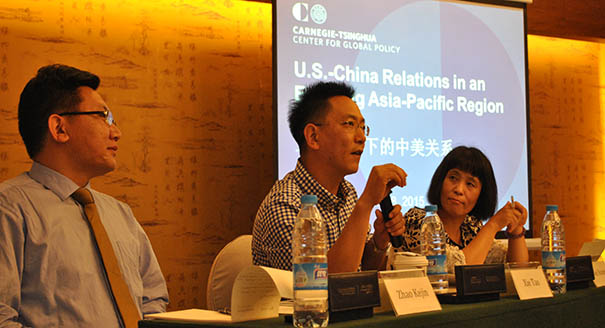Registration
You will receive an email confirming your registration.
As Chinese President Xi Jinping prepares for his first state visit to the United States in September, U.S.-China relations are approaching a critical juncture. Growing strategic rivalry, especially in the Asia-Pacific region, threatens to undermine the positive cooperation that the two countries announced recently on a host of global issues, including joint efforts to manage carbon emissions. Meanwhile, emerging new institutions and initiatives like the Asian Infrastructure Investment Bank (AIIB) and the One Belt One Road plan, as well as efforts to conclude the Trans-Pacific Partnership, are raising questions about the roles that the United States and China will play in regional economic governance going forward.
Carnegie–Tsinghua’s Zhao Kejin hosted a discussion with a panel of Chinese experts to discuss the future of U.S.-China relations and interactions in the Asia-Pacific region ahead of the Xi-Obama summit this fall.
Discussion Highlights
- President Xi Visits Washington: Panelists underscored the importance of Chinese President Xi Jinping’s scheduled state visit to the United States in September. A productive and well-choreographed summit could do much to reduce current tensions in the bilateral relationship, participants asserted. They added that Xi must do more to present a positive, human face of China to the U.S. general public, just as Deng Xiaoping did during his visit to the United States in the late 1970s. To do so, panelists suggested that President Xi consider meeting with presidential candidates or even participating in U.S. cultural activities.
- Managing Public Distrust: Panelists agreed that the general public in both the United States and China are growing less trustful of each other, though there was no consensus about the scope of this problem. They pointed out that majorities in both countries support friendly relations; these populations, however, are less vocal about their views than nationalistic minorities that may urge their governments to adopt more assertive diplomatic stances. Participants predicted that at least some candidates in the upcoming 2016 U.S. presidential campaign may resort to rhetorical jabs at China to burnish their foreign policy credentials. This likelihood must be handled delicately to avoid undermining cooperation on substantive policy issues.
- Great Powers and National Interests: Several panelists pointed out the historical pattern of how changing power dynamics between rising and established powers can increase the likelihood of conflict. They agreed that both China and the United States are cognizant of this reality and the need to manage their differences constructively. Participants cited the aftermath of Cuban missile crisis as an example of two major powers clearly communicating their national interests to each other to minimize the chances of confrontation. Panelists said that Chinese and U.S. leaders should discuss their national interests candidly in September, by building on President Xi’s proposal of a new model for great power relations.
- Emerging Economic Institutions: Panelists emphasized the importance of China’s One Belt, One Road initiative for economic development throughout Eurasia. They agreed that China’s recent efforts to provide another avenue of development financing through the Asian Infrastructure Investment Bank should not be interpreted as an attempt to dictate the terms of Asia’s development or to undermine existing institutions such as the World Bank or the Asian Development Bank. On the contrary, participants said, a more integrated network of Central and Southeast Asian economies will provide benefits for the region as a whole, as well as for China and the United States.
- The South China Sea: As China’s economy continues to expand in the years ahead, the country’s naval power is also likely to grow, panelists predicted. They proposed diplomatic steps that the two countries can take to strengthen communication channels, such as bilateral meetings of high-level military officials and recurring informal summits between the two countries’ top leaders.
Zhao Kejin
Zhao Kejin is a resident scholar at the Carnegie–Tsinghua Center for Global Policy, where he runs a program on Chinese public diplomacy. He is also an associate professor in the Institute of International Studies at Tsinghua University.
Xie Tao
Xie Tao is a professor of political science at Beijing Foreign Studies University who specializes in U.S.-China relations.
Wei Hongxia
Wei Hongxia is a senior associate with the Institute of American Studies at the Chinese Academy of Social Sciences.
Jie Dalei
Jie Dalei is an assistant professor of political science at Peking University’s School of International Studies.
Zhao Minghao
Zhao Minghao is a research fellow at the China Center for Contemporary World Studies and a nonresident fellow at the Center for International and Strategic Studies at Peking University.
Gong Ting
Gong Ting is a research assistant at the China Institute of International Studies and current Ph.D. student at Peking University’s School of International Studies.
